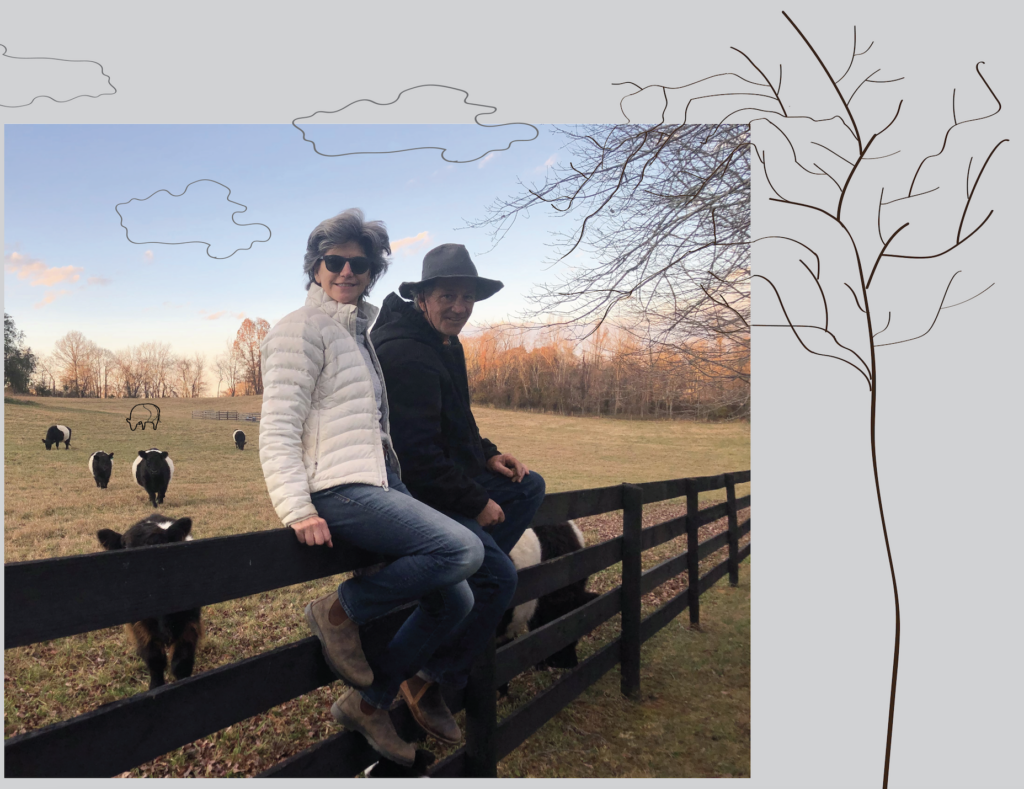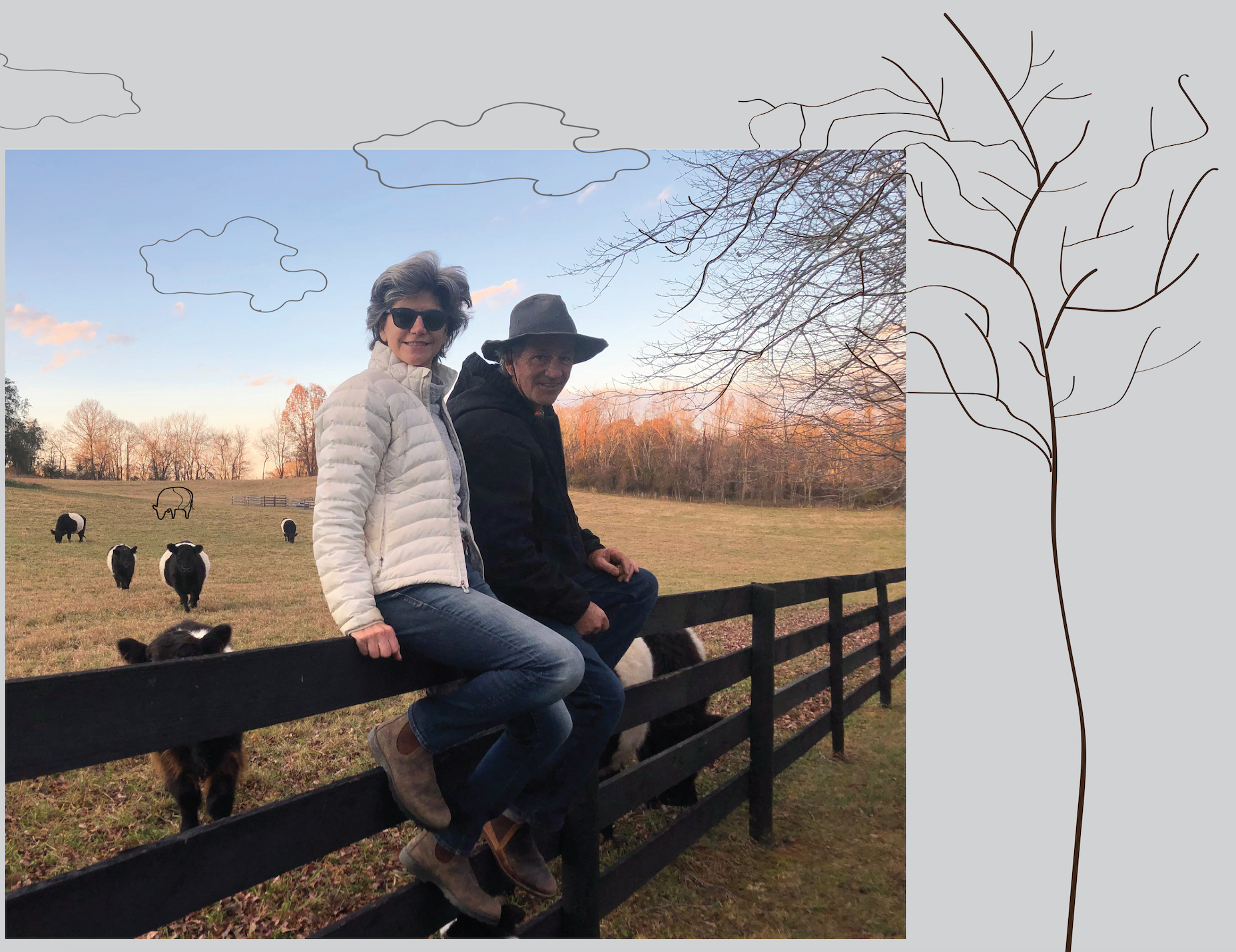From the Hilltop to the Field: A Georgetown Professor’s Journey into Sustainable Agriculture
Colette Loll, adjunct professor in Georgetown University’s Liberal Studies Program and regenerative farmer, interviewed by Common Home

Picture of Loll sitting on her farm fence with illustrations of extra cows and nature. Photo courtesy Collette Loll; Design by Cecilia Cassidy.
What happens when a D.C. professional leaves behind her career to start a second chapter as a regenerative farmer? Common Home talks with Professor Colette Loll on her transition into the sustainable farming world after receiving a doctorate in liberal studies from Georgetown, and how she is combining her passion for the humanities and agriculture with her concerns about climate change and broken food systems–at Brooke Hill Farm in Northern Virginia.
CH: Tell us a little about your farm. How did it come to be?
CL: I lived in Georgetown for over a decade and a lot changed during the pandemic. Like many of us in the city during that time, I was yearning for more space and self-sufficiency. My partner and I drew a one-hour radius around D.C.. We ended up finding this amazing farm property in Marshall, Virginia. Although we both loved gardening, we literally had never talked about farming — and neither of us had any farming experience — but as we walked around this beautiful property, we both thought, “This is it!”
So, we ended up buying a 30-acre farm. There were so many unknowns. The previous owners had cut hay for decades off the land without putting anything back into the soil. What we thought was a beautiful field, we learned had limited biodiversity and absolutely zero nutritional value for livestock. The farmer that had previously rented the field told us we had to start implementing some regenerative practices. We didn’t even know what that was!
We had a lot to learn. Since I had just received my doctorate in liberal studies, I was adept at research and became especially interested in approaching our farm practices from a humanistic perspective. I started going to events and lectures and talking to people with regenerative farming backgrounds. “Regenerative” began to make so much sense. Regenerative agriculture is really about farming in harmony with nature; stopping the traditional fight with nature. At its core, the practice is intended to improve the health of the soil, or to improve highly degraded soil like ours, which in turn symbiotically enhances the quality of water, vegetation and land productivity. Our goal became to breed plants and animals that survive with minimal human intervention. Now, I consider myself a soil farmer. The health of our bodies, food systems and animals is all intimately connected to the health of the soil.
CH: What practices did this learning lead you to undertake?
CL: With help from the American Farmland Trust and Virginia Cooperative Extension, we learned to listen to and better understand our land. We began to invest in the soil. We decided to bring cattle on to the farm to help us achieve our goals. We brought in this wonderful small herd of heritage cattle called Belted Galloway. They’re like the Oreo cookies of the cow world; black with a white stripe down the middle. But what’s really amazing about them is how they could help us regenerate our fields not only by leaving behind natural fertilizer, but because they are non-selective foragers. So, I found a breeder and, wouldn’t you know it, he was a Georgetown graduate as well as the president of the Belted Galloway Society. He helped me start my herd and we have been breeding them since.
In addition to livestock, we began trying other techniques to increase the biodiversity on the farm. We started to delay haying during spring and early summer; which means you don’t cut your fields until after ground nesting birds have hatched out their clutches. It raised a lot of questions from our neighbors. Old-timer farmers would come by and say, “you really need to cut this field,” and we would tell them we were waiting for June 1st to support the nesting birds.
We put in kestrel boxes to support the population of these amazing predators, North America’s smallest falcons. We are delighted to see that they have taken up residence. We also planted large pollinator gardens with only native plants; natives are much lower maintenance than typical landscaping plants because they are well adapted to the climate, light and soil conditions that characterize their ecosystem. In doing so, we also removed many invasive non-native species. As a result of these efforts, we recently got certified by the National Audubon Society for our bird-friendly habitat management.
At the root of it all, we are acting with the belief that improved soil health is the most important result we can achieve. To meet this goal, we do not spray harmful pesticides, add synthetic fertilizers and minimize our tillage. We’re practicing rotational grazing, planting diverse forage for our livestock and, of course, we’re only using organic practices in the vegetable garden. We are beginning to see for ourselves how good food and clean environments keep people and animals healthy, resilient and energized.
A major caveat in everything I have said is that I am fortunate in that we can experiment and learn by doing while not having the added pressure of making a living through farming. I’ve met so many young people out here, and unless you’ve inherited land, it is very hard for the new generation of farmers to own and operate a farm profitably, which is so unfortunate. For us, it was kind of a pastime that became a passion that’s now becoming a lifestyle. As I move into retirement from my professional life, I feel I am transitioning into the job of steward, which is just as consuming and full-time as my career once was, but it’s so much more tangible and gratifying.
CH: It sounds like you have an interesting relationship with your community in which the education is flowing multi-directionally. Would you like to say more about your relationship to the community?
CL: We have a very conscientious, tight-knit agricultural community. This whole process has made me more aware of where food comes from, how it is raised, its nutritional value, etc… Now, I not only rely on growing, raising and sharing my own food and beef, I seek out local producers from the area. I like knowing who raised it, what farm it came from and their practices. I avoid industrial food production at all costs.
I’ve also become deeply invested in the gardening community. I became a certified Master Gardener. The first year I was here, I spent around $400 in seeds and plants. This year, I think I only spent $25 because we’re all saving and swapping seeds. We tour each other’s farms, give advice and share our bounty through a local CSA (a model of food distribution in which customers buy a share of farm goods to provide reliable income to farmers). When I had an older cow I realized I was going to have to process, a local regenerative farmer offered to share a processing slot, (notoriously hard to get) and we shared hundreds of pounds of beef with friends, family and a local food bank.
CH: After all you have learned, you have decided to come back to Georgetown to teach a course on regenerative agriculture. Tell us more about your interest there.
CL: Regenerative agriculture has become such a passion for me. It is shocking to see the extent to which the industrial agricultural and food system is broken. To me, the interdependence between climate change, food systems and regenerative agriculture is one of the most humanistic relationships we can study. I am teaching a class in the graduate liberal studies program next spring semester, and I’m hoping it will be a popular elective.
I think that the younger generation is interested in knowing where their food is coming from, but I still don’t think most of our population is truly connected to their food source. Some of the lifestyle choices that are trendy, like plant-based diets, are really great for the environment but they have their drawbacks and people should be able to think critically about the nuances of environmentalism. It is difficult because there are a lot of conflicting messages. For myself, I feel great about eating out of my own backyard, especially when I have raised my plants and animals in a regenerative and sustainable manner. I don’t feel conflicted about eating grass-fed, locally produced and humanely processed beef.
I think it’s all about perspective, but to me, that’s why learning about these practices makes sense in a liberal studies curriculum where we can apply a more humanistic lens. I think as a culture, we are very disconnected from our food source. We need to fix that. My career was as an art authenticator and a fraud investigator; I spent my time working with law enforcement and museums on authentication projects. So, farming was completely outside of my core competency. But, what helped me ease into this field was the way in which my Georgetown studies taught me how to research, critically analyze and look at the world from a humanistic angle. When I got my own land, my studies prompted me to ask questions that allowed me to connect my property to my belief system and concern for our Earth.
Part of living on a farm is that you notice the effects of climate change in your day-to-day life. You don’t always notice it working in the city, but on the farm when the bulbs and blooms are way too early or the rain doesn’t green the field fast enough for the cows to graze, you notice. So how do we position ourselves to do a little bit of good in a situation that seems so catastrophic? You can get really depressed about it. Or you can say, well, in my little piece of God’s green earth, I’m going to do the best I can do. And, I think if Georgetown teaches you anything, it’s how to be curious, how to ask a lot of questions and how to look at problems we face as a collective whole from a multidisciplinary angle. Solutions start with asking the right questions. I hope my students will ask the right questions.

